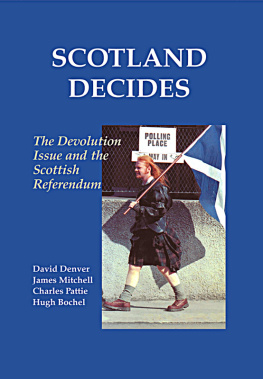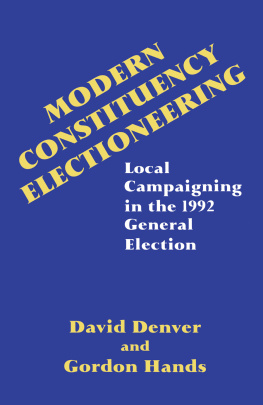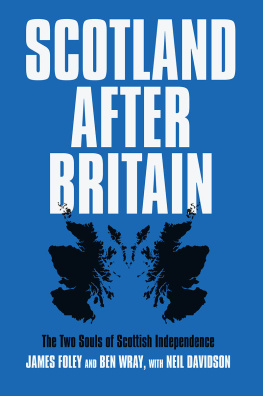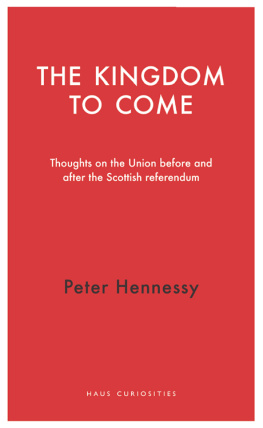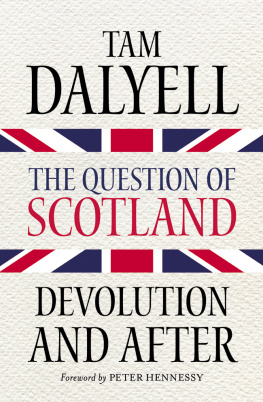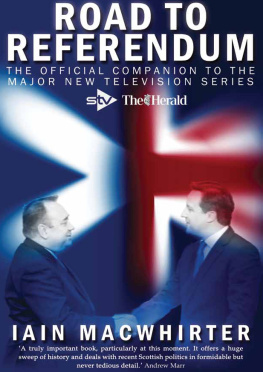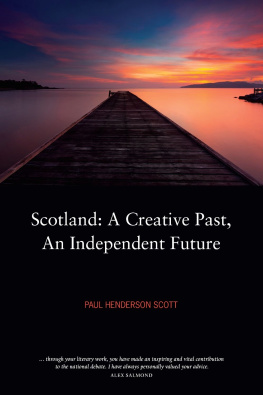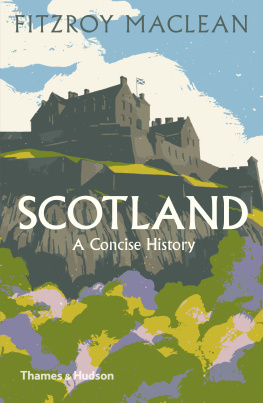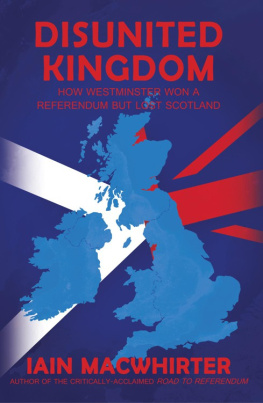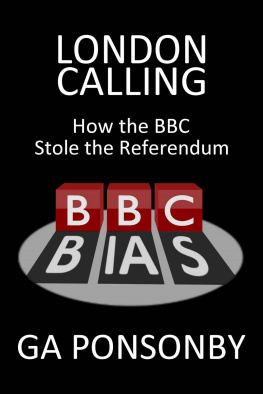SCOTLAND DECIDES
SCOTLAND
DECIDES
The Devolution Issue and the
1997 Referendum
David Denver James Mitchell
Charles Pattie Hugh Bochel
First published in 2000 in Great Britain by
Routledge
2 Park Square, Milton Park, Abingdon, Oxon, OX14 4RN
270 Madison Ave, New York NY 10016
Transferred to Digital Printing 2006
Website: www.routledge.com
Copyright 2000
David Denver, James Mitchell, Charles Pattie and Hugh Bochel
British Library Cataloguing in Publication Data
Scotland decides: the devolution issue and the 1997
referendum
1. Scotland. Parliament 2. Decentralization in government
Scotland 3. Referendum Scotland 4. Scotland Politics and
government 20th century
I. Denver, D.T. (David Trodden), 1944
320.9411
ISBN 0-7146-5053-6 (cloth)
ISBN 0-7146-8104-0 (paper)
Library of Congress Cataloging-in-Publication Data
Scotland decides: the devolution issue and the 1997 referendum /
David Denver [et al.].
p. cm.
Includes bibliographical references and index.
ISBN 0-7146-5053-6 (cloth) - ISBN 0-7146-8104-0 (pbk.)
1. Referendum-Scotland. 2. Scotland-Politics and
government-20th century. 3. Elections-Scotland. 4. Political
participation-Scotland.
5. Scotland. Parliament-History-20th century. I. Denver, D.T.
JF497.G7 S26 2000
320.1509411-dc21 99-088817
All rights reserved. No part of this publication may be reproduced, stored in or
introduced into a retrieval system or transmitted in any form or by any means,
electronic, mechanical, photocopying, recording or otherwise, without the prior written
permission of the publisher of this book.
Publisher's Note
The publisher has gone to great lengths to ensure the quality of this
reprint but points out that some imperfections in the original
may be apparent
Contents
List of Tables and Figures
TABLES
FIGURES
Foreword
September 11 1997 was a turning-point in the history of the United Kingdom. By three to one the Scottish electorate opted to institute a Scottish Parliament. The changes reverberating from that decision will alter the politics of Britain for ever, even if we do not yet know how.
In 1979 a similar attempt at innovation fell at the referendum hurdle. The rules of the political game as well as the public's attitudes to central government have been much modified over the last twenty years. David Denver and his colleagues chronicled the Scottish disappointment in 1979; they have now chronicled its reversal twenty years on in a book that shows a penetrating understanding of the forces, both in haute politique and mass electioneering, which produced the volte-face.
The study of politics in these islands has been greatly enriched by well-written, detailed research into individual events, composed with an appreciation of their wider national and international context. This book is a notable example of the genre.
Dr David Butler
Nuffield College
Oxford
Preface
On 16 January 1707 the independent Scottish Parliament ratified the Treaty of Union with England by 110 votes to 67. On 25 March the Parliament adjourned and on 28 April it was formally dissolved (see Ferguson, 1977: ch. 4). Throughout the session popular opinion had been clearly opposed to the Treaty, with pro-Union members being manhandled by the mob in Edinburgh, anti-Union riots in Glasgow and the Articles of Union being ceremonially burned by 300 armed Cameronians in Dumfries (ibid.). The Union was carried by the Parliament against the country (p. 266) and to the popular mind the treaty seemed nothing but a base betrayal and its negotiators traitors (p. 230). In the immediate aftermath of Union the mood of most people was sombre if not sullen (p. 270).
Eighty-five years later the event was still being lamented by Robert Burns. The Union had made Scotland England's province and his verdict on the passage of the Treaty was:
We're bought and sold for English gold;
Such a parcel of rogues in a nation!
During the nineteenth century, although Scots retained a distinct identity and culture within the United Kingdom, the Union came to be widely accepted. Towards the end of the century the Scottish Office was established to provide some administrative devolution but although home rule sentiment was never quite eliminated, political devolution was not of great interest to most Scots. This changed from the 1960s onwards and 292 years after the original Scottish Parliament dissolved itself, on 1 July 1999, in the Church of Scotland Assembly Rooms in Edinburgh, the Queen opened the first session of a new Scottish Parliament.
This book examines the process by which the new Parliament came to be established. We trace the origins and history of the demand for home rule, paying special attention to developments following the failure of the first referendum on the issue in 1979. These culminated in a second referendum which was held in September 1997. Referendums have been rare events in United Kingdom politics but this one produced a decisive result and led directly to the creation of a Parliament in Scotland for the first time in almost 300 years. Such a major event merits detailed consideration and provides the focus for most of the book. The penultimate chapter looks at developments in the politics of devolution in the aftermath of the referendum and provides an appraisal of prospects for the new Parliament. We also include a postscript which summarises and discusses the implications of the results of the first elections to the Scottish Parliament.
The research on which this book is based was made possible by an award from the ESRC (ref. R000237374) which we gratefully acknowledge. We are also grateful to Mark Stuart who acted as research assistant on the project and whose meticulous attention to detail and capacity for hard work did much to ensure its success. Michael Cavanagh of the University of Strathclyde also provided valued assistance, particularly in relation to the chapter on the Scottish media, and we would like to record our thanks here.
We would also like to thank the officers of the political parties in Scotland and referendum campaign group leaders who were willing to be interviewed; John and Dorothy Bochel for analysing local newspapers; Susan Anderson, Stephen Dunstan, Brent Collins and Ritchie Denver for envelope stuffing and coding; and the 2,335 Scottish voters who returned completed questionnaires. The poem from The Herald is reproduced with permission.
This is a genuinely co-authored book. Although individuals took responsibility for the initial draft of specific chapters and sections, all of the authors read and contributed to each of them. We are, therefore, jointly responsible for any errors of fact and for the interpretations offered.
It should perhaps be recorded that, although all four of us now work in English universities, we are all Scots (having travelled the same path as many in previous generations). Like most expatriates we remain strongly attached to our country. Nonetheless, the account offered here is as detached as we can make it.
David Denver
James Mitchell
Charles Pattie
Hugh Bochel
May 1999
1
Scottish Devolution: The
Historical Context
INTRODUCTION

